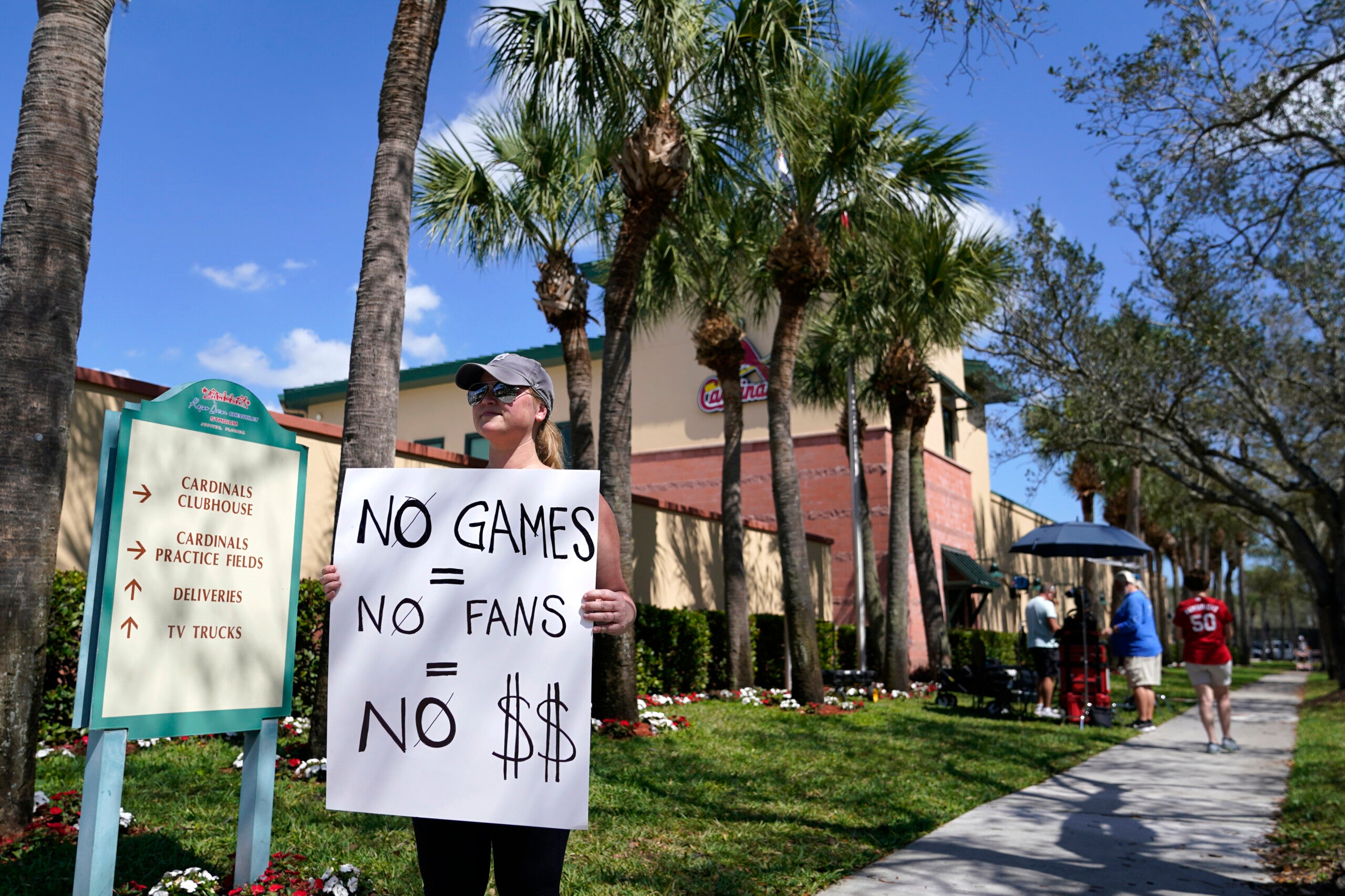MLB labor talks intensify as deadline nears to save openers
JUPITER, Fla. (AP) — Locked-out players and Major League Baseball engaged in a series of intense meetings that stretched into Monday night as they attempted to forge the path to a labor deal before management’s deadline for salvaging opening day on March 31.
The sides met several times throughout the day and made progress toward an agreement, but they remained very far apart on key issues.
Commissioner Rob Manfred met with the union twice — once more than he had previously since the lockout started Dec. 2. After months of talks in fits and starts, the sides shifted into possible deal-making mode.
“We’re working at it,’” Manfred said around 6 p.m. after his second session of the day with the union.
Deputy commissioner Dan Halem and executive vice president Morgan Sword were key figures in the meetings. Sword and senior vice president Pat Houlihan returned to the union side around 10:45 p.m. for the ninth session of the day, a meeting that lasted only a few minutes.
The league and union were negotiating for the eighth straight day after meeting just six times on core economics during the first 2 1/2 months of the lockout. They have laid out their positions to each other in detail, both agreeing to funnel more money to young players but entering the day far apart on many economic terms.
Manfred said a deal had to be reached by Monday to maintain four weeks of spring training ahead of a 162-game schedule. MLB has not fixed an exact time to the deadline, which led to the possibility of bargaining sessions stretching into the wee hours if both sides sense an agreement within reach.
The union has not said whether it agrees with the deadline, and baseball has shortened spring training to as few as three weeks in the past.
On the 89th day of baseball’s second-longest work stoppage, emotions became more heated as the sides pressed for each other’s bottom line. Philadelphia star Bryce Harper posted a photo on Instagram altered to show him in a Japanese baseball uniform with the words: “Yomiuri Giants you up? Got some time to kill.”
Yankees pitcher Jameson Taillon, who attended negotiations last week, tweeted: “Players are used to their ‘threats.’ Owners actions have made it clear all along that they have a set # of games where they still make profits/get TV money. They don’t want to play. It’s sad that these are the guys who drive the direction and ‘future’ of our amazing sport.”
The sides arrived at 10 a.m., three hours earlier than previous days, at Roger Dean Stadium, the vacant spring training home of the Miami Marlins and St. Louis Cardinals.
Mets pitcher Max Scherzer and free agent reliever Andrew Miler were the only players on hand. Halem, Sword and Colorado Rockies CEO Dick Monfort also took part in the talks.
Players would lose $20.5 million in salary for each day of the season that is canceled, according to a study by The Associated Press, and the 30 teams would lose large sums that are harder to pin down.
Spring training games were to have begun Saturday, but baseball’s ninth work stoppage — and first since 1995 — already has led to exhibitions being canceled through March 7.
The most contentious proposals in dispute involve luxury tax thresholds and rates, the size of a new bonus pool for pre-arbitration players, minimum salaries, salary arbitration eligibility and the union’s desire to change the club revenue-sharing formula.
In addition, MLB has tied the elimination of direct free-agent compensation to players agreeing to higher luxury tax rates and still wants to expand the playoffs to 14 teams rather than the union’s preference for 12. MLB also has kept its proposal for an international amateur draft on the table.
Not since Aug 30, 2002, has MLB come this close to losing regular-season games to labor strife. The union was set to strike at 3:20 p.m., but roughly 25 consecutive hours of meetings and caucuses culminated in an agreement at 11:45 a.m.
Bargaining has not had that type of frequency this year, but it has gained momentum since talks shifted from New York to Florida last week.
MLB has offered to raise the luxury tax threshold from $210 million last season to $214 million this year, increasing it to $220 million by 2026. Teams also want higher tax rates, which the union says would tend to act like a salary cap.
Players have asked for a $245 million threshold this year, rising to $273 million by the final season.
The union wants to expand arbitration to include the top 35% by service time of players with at least two seasons of major league service and less than three, up from the 22% cutoff in place since 2013.
The union proposed the pre-arbitration pool have $115 million distributed to 150 players, and management wants $20 million to be split among 30.



